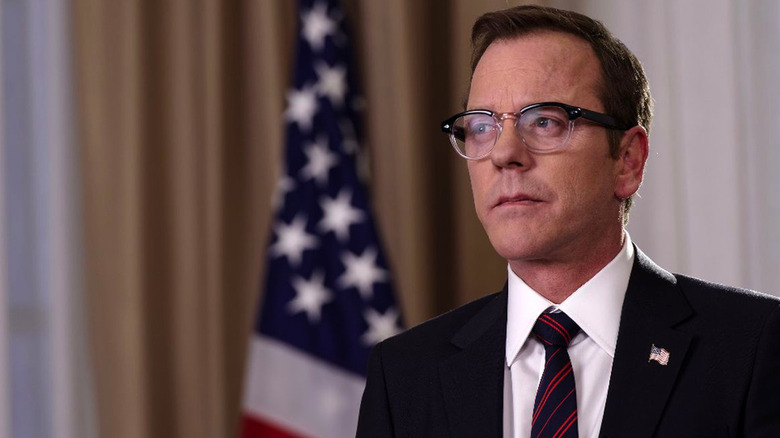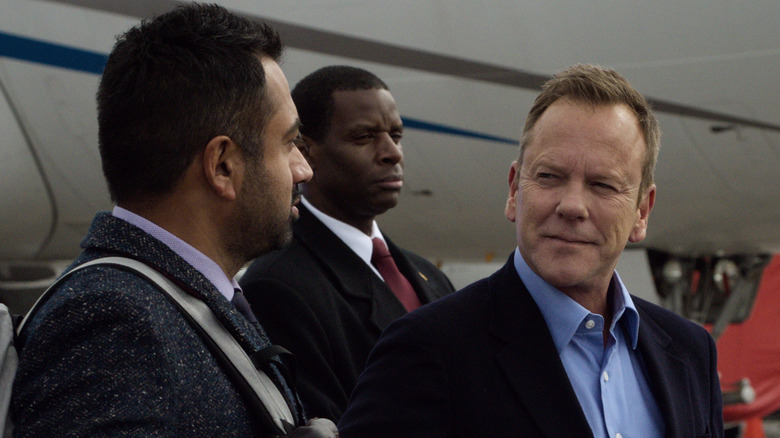Why Was Designated Survivor Cancelled?
Remember when Kiefer Sutherland was President of the United States? No, I'm not talking about some alternate reality that only I am magically aware of, I'm talking about the TV series "Designated Survivor." The series was ridiculous-sounding while also based on a real-life fact: whenever the branches of government are gathered together in one building for the State of the Union, one member of the chain of the presidential line of succession stays behind, just in case. In "Designated Survivor," the "just in case" happens — during the State of the Union, the Capitol Building explodes, killing the President — and everyone else in the line of succession, with the notable exception of the Secretary of Housing and Urban Development, Thomas Kirkman.
That's Sutherland's character, and as a result of this tragedy, he's sworn in as President of the United States immediately — and he didn't even have to campaign! It's a wild premise and there's plenty of potential there for a conspiracy-heavy political thriller. But "Designated Survivor" had a bumpy road, and after two seasons it ended up canceled — only to be saved by Netflix. But then, after one season on the streaming service, the show was canceled again.
So what happened?
Creative twists and turns
"Designated Survivor" premiered on ABC in 2017 and ended up with fairly good reviews — the Rotten Tomatoes consensus states "Kiefer Sutherland skillfully delivers the drama in Designated Survivor, a fast-paced, quickly engrossing escapist political action fantasy." The ratings were good enough for the show to land a second season, too. But all was not well in "Designated Survivor" land. ABC canceled the show after its second season, and after the cancelation, Variety reported that "a revolving door of showrunners" contributed to behind-the-scenes troubles.
Star Sutherland was also unhappy with the "creative twists and turns that the series took" as the show "zig-zagged from being a political thriller to a more earnest look at the struggles of Sutherland's Tom Kirkman and his family amid the fishbowl of living in the White House." In other words, the show started off being one thing, but the ever-shifting behind-the-scenes issues resulted in a mutation that changed the show as the story progressed.
Then there was the matter of location. The series was shot in Toronto, but Sutherland wanted to move the production to Los Angeles — a move that would raise the cost of production. All of these factors contributed to a show coming to an end on network TV. But all was not lost for the series, because Netflix swooped in to save the day.
At least at first.
Enter Netflix...then exit
ABC's loss was Netflix's gain. The streaming giant picked up the canceled show and aired a third season that consisted of 10 new episodes. But unfortunately, this was only a brief respite. After one season of streaming, "Designated Survivor" was canceled yet again. Again, behind-the-scenes matters seem to have played a part (Netflix doesn't release ratings, so we have no idea how well the show did there). As Deadline reported at the time, Netflix and the show's distributor, Entertainment One, struck only one-year deals with the show's cast. That meant once the season was up, so were the contracts.
"I don't think [season 4] is going to happen," Keifer Sutherland said on Scala Radio (via Digital Spy). "We had an amazing experience with Netflix and a kind of freedom that was wonderful. But the reality is, because the contracts were so complicated and different from network television to Netflix, they didn't book a lot of the actors who were on the show and they took other jobs. I don't blame them for a second for that."
As for Netflix, they released the following statement:
"We are proud to have offered fans a third season of Designated Survivor, and will continue to carry all three seasons for years to come. We're especially thankful to star and executive producer Kiefer Sutherland, who brought passion, dedication and an unforgettable performance as President Kirkman."
In other words, President Kirkman's days as Commander-in-Chief were over.


